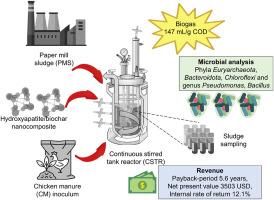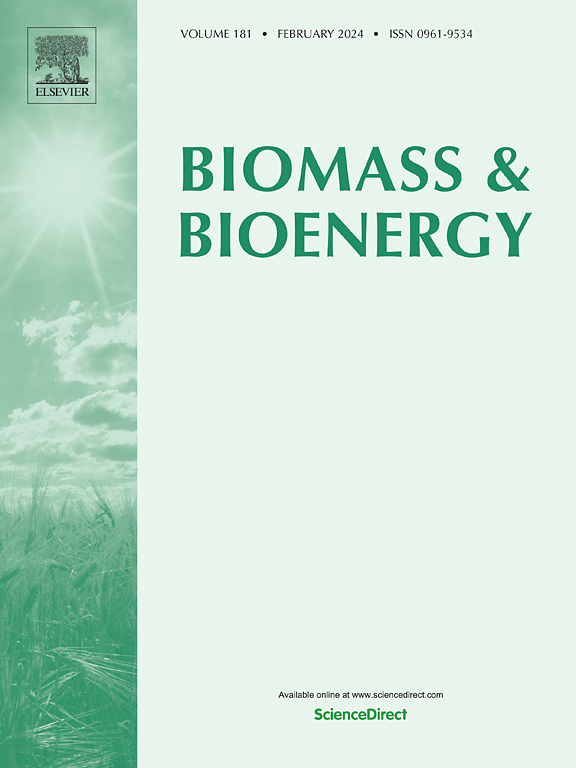Valorization of paper-mill sludge laden with 2-chlorotoluene using hydroxyapatite@biochar nanocomposite to enrich methanogenic community: A techno-economic approach
IF 5.8
2区 生物学
Q1 AGRICULTURAL ENGINEERING
引用次数: 0
Abstract
While several studies have investigated the anaerobic digestion of paper-mill sludge (PMS), this technology suffers from nutrient insufficiency, inhibition by aromatic compounds, and low bio-CH4 yield. Hence, PMS was anaerobically co-digested with chicken manure (CM) and supplemented by hydroxyapatite@biochar (HAP@BC) nanocomposite for enhancing 2-chlorotoluene degradation and enriching the methanogenic archaea. Multiple continuous stirred tank reactors (CSTRs) were operated at 12.6 h hydraulic retention time (HRT), using PMS (R1), CM (R2), PMS + CM (R3), PMS + CM+100 mg HAP/L (R4), and PMS + CM+100 mg HAP@BC/L (R5). The maximum bio-CH4 yield of 147.5 ± 9.1 mL/g COD and 2-chlorotoluene removal of 91.2 ± 6.8 % were obtained from R5, experiencing a sufficient C/N ratio of 14.7 and the highest activities of acidogenesis (42.0 %), acetogenesis (37.9 %), and methanogenesis (42.1 %). The abundances of Euryarchaeota, Bacteroidota, and Chloroflexi at the phylum level, and Pseudomonas, and Bacillus at the genus level could highly contribute to the dechlorination mechanism and acetate transformation into CH4. This biomass-to-bioenergy project (10 m3/d capacity) could benefit from pollution reduction, biogas recovery, and carbon credit, giving 5.6 yr payback-period, 3503 USD net present value, and 12.1 % internal rate of return. Because R5 exhibited an efficient techno-economic anaerobic biodegradation performance, future studies are required to optimize its HRT condition and HAP@BC dosage.

使用羟基磷灰石@生物炭纳米复合材料对含有2-氯甲苯的造纸厂污泥进行增值处理,以丰富甲烷菌群落:技术经济方法
虽然已有多项研究对造纸厂污泥(PMS)的厌氧消化进行了调查,但该技术存在养分不足、芳香族化合物抑制和生物-CH4 产率低等问题。因此,将造纸污泥与鸡粪(CM)进行厌氧协同消化,并辅以羟基磷灰石@生物炭(HAP@BC)纳米复合材料,以提高 2-氯甲苯的降解能力并丰富产甲烷古细菌。在 12.6 小时水力停留时间(HRT)下,使用 PMS(R1)、CM(R2)、PMS + CM(R3)、PMS + CM+100 mg HAP/L(R4)和 PMS + CM+100 mg HAP@BC/L (R5)运行多个连续搅拌槽反应器(CSTR)。R5 的生物-CH4 产量最高,为 147.5 ± 9.1 mL/g COD,2-氯甲苯去除率为 91.2 ± 6.8%,C/N 比为 14.7,酸生成(42.0%)、乙酰生成(37.9%)和甲烷生成(42.1%)活性最高。在门一级,极毛藻属、类杆菌属和绿藻属,在属一级,假单胞菌属和芽孢杆菌属的大量存在,对脱氯机制和醋酸盐转化为 CH4 有很大的促进作用。该生物质转化为生物能源项目(10 立方米/天)可从减少污染、沼气回收和碳信用中获益,投资回收期为 5.6 年,净现值为 3503 美元,内部收益率为 12.1%。由于 R5 表现出高效的技术经济厌氧生物降解性能,因此今后需要对其 HRT 条件和 HAP@BC 剂量进行优化研究。
本文章由计算机程序翻译,如有差异,请以英文原文为准。
求助全文
约1分钟内获得全文
求助全文
来源期刊

Biomass & Bioenergy
工程技术-能源与燃料
CiteScore
11.50
自引率
3.30%
发文量
258
审稿时长
60 days
期刊介绍:
Biomass & Bioenergy is an international journal publishing original research papers and short communications, review articles and case studies on biological resources, chemical and biological processes, and biomass products for new renewable sources of energy and materials.
The scope of the journal extends to the environmental, management and economic aspects of biomass and bioenergy.
Key areas covered by the journal:
• Biomass: sources, energy crop production processes, genetic improvements, composition. Please note that research on these biomass subjects must be linked directly to bioenergy generation.
• Biological Residues: residues/rests from agricultural production, forestry and plantations (palm, sugar etc), processing industries, and municipal sources (MSW). Papers on the use of biomass residues through innovative processes/technological novelty and/or consideration of feedstock/system sustainability (or unsustainability) are welcomed. However waste treatment processes and pollution control or mitigation which are only tangentially related to bioenergy are not in the scope of the journal, as they are more suited to publications in the environmental arena. Papers that describe conventional waste streams (ie well described in existing literature) that do not empirically address ''new'' added value from the process are not suitable for submission to the journal.
• Bioenergy Processes: fermentations, thermochemical conversions, liquid and gaseous fuels, and petrochemical substitutes
• Bioenergy Utilization: direct combustion, gasification, electricity production, chemical processes, and by-product remediation
• Biomass and the Environment: carbon cycle, the net energy efficiency of bioenergy systems, assessment of sustainability, and biodiversity issues.
 求助内容:
求助内容: 应助结果提醒方式:
应助结果提醒方式:


